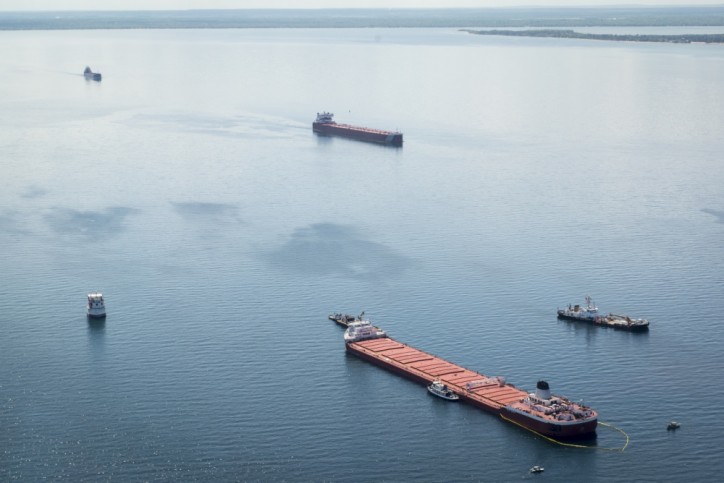A safety study released Tuesday by the National Transportation Safety Board (NTSB) details 14 conclusions and 21 recommendations aimed at further reducing the risk of collisions, allisions, and groundings involving vessels operating within U.S. Coast Guard Vessel Traffic Service areas.

Two freighters transit upbound the Soo Locks past the safety zone established by the U.S. Coast Guard around the motor vessel Roger Blough near Gros Reefs Light, May 30, 2016 in Lake Superior. The safety zone was established after the Blough ran aground on the reef May 27. (U.S. Coast Guard photo by Petty Officer 2nd Class Christopher M. Yaw)
The study, “An Assessment of the Effectiveness of the U.S. Coast Guard Vessel Traffic Service System” (NTSB/SS-16/01), focused on the performance of the Coast Guard’s VTS system, currently comprised of 12 VTS centers. The need for the study was driven by the investigation of six major commercial vessel accidents since the Coast Guard’s 2009 implementation of its “Vessel Traffic Service National Standard Operating Procedures Manual.” Information provided by the Coast Guard indicates collisions, allisions and groundings within VTS areas between 2010 and 2014 resulted in two fatalities, 179 injuries and more than $69 million in damage to vessels, facilities, infrastructure and the environment.
“Variance within a single safety system is itself a potential hazard and mariners traveling from one VTS to another must be able to rely on consistent Coast Guard services,” said NTSB Chairman Christopher Hart. “The recommendations contained in our safety study, if acted upon, will improve the effectiveness of the VTS system throughout America’s waterways. I note with appreciation the Coast Guard’s openness and transparency with our investigators and the service’s treatment of our study as a thorough and independent effort to improve Coast Guard operations.”
The NTSB issued 17 of its 21 recommendations to the U.S. Coast Guard, one to the American Pilots Association, two to the American Waterways Operators and one recommendation was issued to the Radio Technical Commission for Maritime Services.
The abstract of the Vessel Traffic Service Safety Study is available online, the full report is expected to be published within several weeks.
Source: NTSB